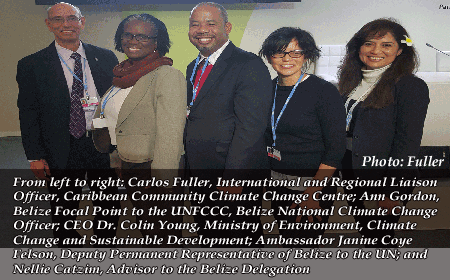BELIZE CITY, Tues. Dec. 22, 2015–In Paris earlier this month, 195 countries, including Belize, reached a historic climate change accord intended to scale back the dire effects that are possibly being felt in Belize in the form of accelerated erosion of beaches along the country’s coast, drought in central and northern Belize, bleaching on the country’s world renowned barrier reef and unusual flood events.
At the 21st Annual Conference of Parties held recently in France, Belize was represented by a 10-member delegation led by Dr. Omar Figueroa, Minister of State in the Ministry of Agriculture, Fisheries, Forestry, the Environment and Sustainable Development.
UN Secretary General Ban Ki-moon said: “We have entered a new era of global cooperation on one of the most complex issues ever to confront humanity. For the first time, every country in the world has pledged to curb emissions, strengthen resilience and join in common cause to take common climate action. This is a resounding success for multilateralism.”
“The Paris Agreement allows each delegation and group of countries to go back home with their heads held high. Our collective effort is worth more than the sum of our individual effort. Our responsibility to history is immense,” said Laurent Fabius, President of the COP 21 UN Climate Change conference and French Foreign Minister.
It is momentous that the participating countries have committed to checking human-induced global warming. An article featured on the website of the United Nations Framework Convention on Climate Change (UNFCCC) said that, “The universal agreement’s main aim is to keep a global temperature rise this century well below 2 degrees Celsius and to drive efforts to limit the temperature increase even further to 1.5 degrees Celsius above pre-industrial levels”—a commitment that is good for people, and good for the environment.
“To reach these ambitious and important goals, appropriate financial flows will be put in place, thus making stronger action by developing countries and the most vulnerable possible, in line with their own national objectives,” it added.
The financing arrangement calls for US$100 billion by 2020, but calls for a new goal on the provision of finance from the US$100 billion floor by 2025.
Carlos Fuller, International and Regional Liaison Officer at the Caribbean Community Climate Change Center (CCCCC or 5C’s) and chief negotiator for Belize at COP 21, called it “a landmark agreement” which seals an international commitment to limit the climate change, which has already been affecting Belize through accelerated erosion, drought, flooding, etc.
Under the agreement US$100 billion a year would also be committed in the first instance to combat climate change impacts by implementing adaptation initiatives. How much of the pie will a small country like Belize get? Fuller explained that the amount Belize would get would be determined not by demographics but by the need Belize has for climate change interventions based on a basket of projects that would be developed. Developing countries like Belize would not be expected to foot the bill, he said.
Fuller said that the CCCCC, based in Belize, plays a pivotal role in implementing a regional approach to combating climate change in line with its 2021 Implementation Plan.
This year, Belize applied for funding from the World Bank to conduct baseline studies to determine the level of carbon stocks that could form a basis for the country receiving carbon credits, through such programs as the UN REDD-plus (Reducing Emissions from Deforestation and Forest Degradation), which goes beyond deforestation and forest degradation, and includes the role of conservation, sustainable management of forests and enhancement of forest carbon stocks.
The effort does entail a commitment that the beneficiary country will not touch the forests for which it would be receiving carbon credit, so development would have to be planned with this in mind.
According to Fuller, Belize is also in bilateral talks with partners in the US and the EU to source financing to jumpstart some of its climate change initiatives.
In relation to the Paris Agreement, the next step for Belize would be to sign and ratify the agreement. Fuller said that the agreement would be opened for signature in May 2016, to take effect in 2020.
He said that Belize also needs to submit a document called the nationally determined contribution or NDC, which would have to be submitted every 5 years, but it has already submitted an initial NDC well ahead of the deadline which could be easily updated to meet this commitment.
Areas covered by the Paris agreement include: Mitigation – reducing emissions fast enough to achieve the temperature goal; a transparency system and global stock-take – accounting for climate action; adaptation – strengthening ability of countries to deal with climate impacts; loss and damage – strengthening ability to recover from climate impacts; and support – including finance, for nations to build clean, resilient futures.

